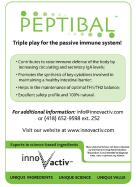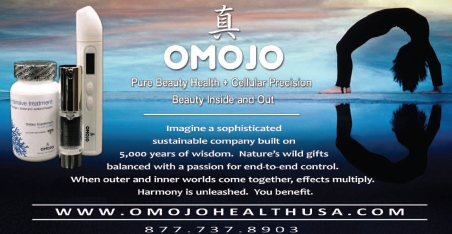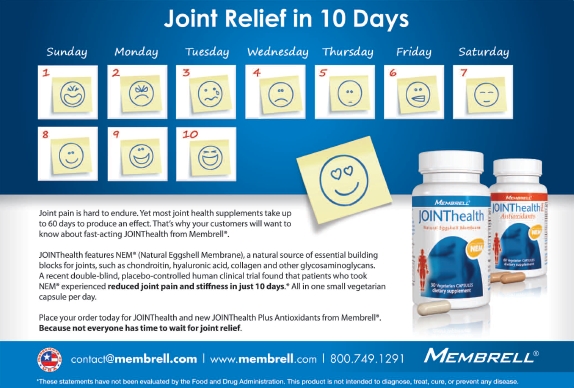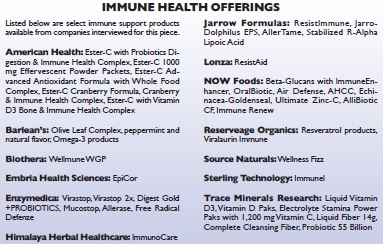Aside from achieving a general sense of well-being, immune health support is a process without obvious markers of success, at least for the average person. Remaining healthy is, of course, the goal, but the vigilance of the body’s defenses tends to go unappreciated until an illness actually strikes. And yet, consumers seem to flock to the often intangible comforts that immunity-promoting products can provide.
“Sales of immune-supporting products are reaching new heights,” says Dilip Patel, Ph.D., director of R&D and quality for Sterling Technology Inc., Brookings, SD. He notes that health products with immune benefit claims top retail sales among supplements, according to a recent report (1). The attraction for shoppers is easy to understand. An efficient immune system can mean more energy, on top of good health, and staying in commission for the tasks and enjoyment of everyday life is at the top of everyone’s to-do list. So, it stands to reason that immune health products remain in vogue through every stage of the calendar.
Health in the Balance
Talking about the immune system is often difficult, in part as a consequence of all we understand about it today. You have to be careful, that is, about which bodily systems you leave out of the equation. “The immune system isn’t a separate, mysterious, stand-alone compartment somewhere in the body. The immune system is our digestive system. The immune system is our nervous system,” says Grace Ormstein, MD, scientific herbal advisor to Himalaya Herbal Healthcare, Houston, TX. It’s misleading to place immunity in a box, she explains, because when we support the whole body, whether it’s through diet, exercise or supplementation, we are always helping to bolster our defenses.
Balance and adaptability are essential for robust and reliable immune responses, as experts will attest. We can modulate the various components of immunity up or down in preparation, but in preventing illness, the only thing that matters is whether the whole immune complex stands at the ready when an actual threat arrives.
Connecting the dots. Scientists and consumers alike are gaining clarity on how to achieve this systemic readiness. More advanced insight into our inner immune workings is translating into greater consumer awareness, and this in turn is reflected in which immune support products are sought after.
It helps at the outset to understand that the blueprint for a well-primed immune system involves more than mere nutrition. Ormstein invokes the concept of psychoneuroimmunology (PNI) (i.e. the interaction between psychology, the nervous system and the immune system). “The more we look at PNI, the more obvious it is that our emotional stress contributes to the lowering of our defenses, leaving our bodies vulnerable to the invasion of foreign agents,” she says.
The stress connection is an important one, especially in the context of the digestive tract. But first, we’ll focus on various substances that can help get our antibodies in order. “Olive leaf complex liquids are beginning to be recognized for their very powerful ability to fight microbes. Coconut oil also has many anti-microbial components,” says Jonny Bowden, Ph.D., CNS, board-certified nutritionist and scientific advisor to Barlean’s, Ferndale, WA. On the subject of olive leaf, Andreas Koch, marketing director for Barlean’s says that products like his company’s that utilize fresh-picked leaves retain more polyphenols that can support immunity, compared with dry olive leaf extracts that deliver fewer. This means broader health benefits and increased antioxidant power, he says.
Bowden explains that though they are less heralded for supporting immunity, vitamin A and zinc show a benefit, too. And, omega-3s should not be passed over in this context either, according to Bowden. “Although they don’t work directly on the immune system, they do work directly on inflammation,” he says, adding that inflammation is a key factor in most common states of illness.
Colostrum, the nutritional liquid of early life for breastfeeding mammals, has the capacity to support immunity when bovine sources are used, according to Patel. “The immune-supporting peptides found in colostrum provide supplemental aid to the body’s own production of resistance supporting defenses,”  he says. Some research has examined how colustrum and its components can modulate immunity, and one recent independent study conducted in Austria found a significant effect on the chemical immune cascade when bovine colostrum was introduced to human cells (2).
he says. Some research has examined how colustrum and its components can modulate immunity, and one recent independent study conducted in Austria found a significant effect on the chemical immune cascade when bovine colostrum was introduced to human cells (2).
Consumers may be glossing over the newfound connection between vitamin D levels and immune health, believes Alexis Buntin, public relations and brand manager for Reserveage, Gainesville, FL. Seasonally induced deficiency of vitamin D, the sunshine vitamin, is increasingly being linked to various health problems and diseases (3). Supplemental intake is the way to combat deficiency, and heightened levels of vitamin D in the blood may benefit immunity in any case. This vitamin is now recognized as being involved in a wide-range of crucial genetic switching activity, and deficiency is hypothesized to be a culprit in the worsening of many illnesses (4).
Vitamin C, meanwhile, is the standby nutrient in the immune-support category and needs little introduction. The supplements, effervescents and combination products that contain it are ever popular with consumers looking to boost their defenses. Bryan Rodriguez, technical marketing and scientific affairs manager for Lonza, Allendale, NJ, explains the role of vitamin C in supporting immunity. He says, “The immune system is a highly complex and interrelated system that has two pathways to address foreign substances. The innate arm of the immune system is non-specific and targets anything that is viewed as foreign to the body, whereas the adaptive system targets specific foreign substances.”
Vitamin C and other substances like it engage one of these aspects of the immunity complex. “While consumers don’t specifically refer to it as the ‘innate arm of the immune system,’ they commonly know that if they are feeling sick, they can quickly take vitamin C or a similar immune stimulator, and it will boost their immune system,” Rodriguez says. Though shoppers maintain this attachment to their daily vitamin C, they are willing to branch out in the name of protecting themselves, according to Angelica Vrablic, Ph.D., nutrition research manager for American Health, Ronkonkoma, NY.
Many of these other options fall under the heading of adaptogenic herbs. Collectively, they are thought to aid the body in its immunity preparations, by increasing one’s ability to cope with stress, fatigue and other environmental challenges. “Adaptogens include echinacea, astragalus, the ginsengs, eleuthero, maca, licorice root, etc., and often include an adrenal support mechanism as part of their usual action,” says Neil E. Levin, CCN, DANLA, nutrition education manager for NOW Foods, Bloomingdale, IL.
There is a definite buzz surrounding the potential of echinacea, Bowden says, but he adds that some of the research supporting it has been mixed. So, what does the science say? A recent study of the effect of echinacea tincture on certain human immune cells achieved promising results. While it did not stimulate all cell types studied, echinacea helped introduce the proliferation of interleukin-10 cells, an anti-inflammatory agent, and of mononuclear blood cells crucial to immune responses (5).
The proper cleansing and detoxification of the liver, kidney and colon are important to immune function, and Ormstein explains that herbal products have a role to play here, stating, “Amla supports normal upper respiratory function and cell restoration, but it’s also good for digestive and liver support.” She goes on to say that guggul supports normal inflammation and immune response by modulating white blood cells. Indian Tinospora also supports liver function, as well as nervous system and urinary function, and Indian Madder can help with liver detoxification and cell restoration, according to Ormstein.
Yin Chiao is an immune-boosting herbal preparation from China that combines honeysuckle and forsythia, as well as several other herbs like licorice, according to information provided by Source Naturals, Scotts Valley, CA. The phytonutrients in the compound, principally chlorogenic acid, arctiin and forsythin, have properties that support immunity in the early stages of a systemic imbalance.
Contrasting holistic herbal products with the allopathic drug model of symptom relief, Ormstein had this to say: “We in the natural product industry need to focus on our own strength, which begins by just taking care of the whole body. Herbal supplements enhance the body’s ability to restore its own natural healing power.”
If we look at the immunity complex as a tree, we might say that the root system is in the digestive tract. And if this connection was tenuous before for many consumers, it is rarely the case any longer. Consumers understand the importance of digestive flora and a balanced gastrointestinal tract for fueling and directly aiding immune function.
 From the way the digestive system physically slows the progression of antigens, to its influence on immunity at the cellular level, the role of this bodily system in maintaining wellness can’t be overstated. “Digestive health is a key part of what is called ‘host defense’; which is the ability of the body to not only resist, but to send signals that down-regulate the gene expression that governs viral and other organisms’ vigor,” Levin says, adding that this makes a healthy gastrointestinal tract a very inhospitable place for undesirable organisms.
From the way the digestive system physically slows the progression of antigens, to its influence on immunity at the cellular level, the role of this bodily system in maintaining wellness can’t be overstated. “Digestive health is a key part of what is called ‘host defense’; which is the ability of the body to not only resist, but to send signals that down-regulate the gene expression that governs viral and other organisms’ vigor,” Levin says, adding that this makes a healthy gastrointestinal tract a very inhospitable place for undesirable organisms.
Intestinal flora, the balance of which can be altered for the better with probiotics and enzymes, affect not only the strength of our defenses, but the way our immune reactions occur. “In the science literature, these increasingly are being recognized as influencing various sides of the immune equation, which is to say, not just immune vigilance, but also inflammation and immune balance,” says Dallas Clouatre, Ph.D., R&D consultant for Jarrow Formulas, Los Angeles, CA.
Who makes a good candidate for a gut readjustment? “Maldigestion as a result of lifestyle factors, food choice or declining enzyme production can contribute to poor health and potential illness. Travel, antibiotics, antacids, stress, surgery, and poor diet may disturb your bacterial balance and decrease your digestive potential,” says David Barton, director of education for Enzymedica, Port Charlotte, FL. For these people especially, not to mention those that would like to maintain their intestinal fortitude, probiotics and enzymes can help.
As alluded to, probiotics can help the digestive system confront the challenges that the immune system faces. Specific strains can help modulate one’s response to cold, flu and other common infections, according to Clouatre. “Prebiotic supplementation, similarly, has been shown to slash colds and flu by as much as 40% under certain conditions,” he says (6). Prebiotics, such as larch arabinogalactan, are substances that stimulate the growth of desirable bacteria. Many of them, according to Clouatre, also modulate the immune system directly.
There are ways in which probiotics can positively influence immune function that are only now becoming clear. Clouatre says these benefits include the production of certain metabolites that aid immunity, and the binding of bacteria to intestinal immune sensors. There is also now a recognition that pro- and prebiotics help regulate inflammatory pathways. “These developments are significant for consumers because very often pro- and prebiotics are used only in the face of travel to protect against diarrhea or in the face of antibiotic treatment. In fact, daily use of good probiotic blends may offer insurance for immune function in the face of day-to-day challenges,” Clouatre says.
Levin describes a proprietary ingredient (EpiCor from Embria Health Sciences) that is derived from the probiotic Saccharomyces cerevisiae. The ingredient has, according to Levin, been shown to support timely, appropriate immune responses, and to aid natural killer (NK) cell activity. “Another variation of yeast associated with immune health is Saccharomyces boulardii, which is a live probiotic yeast that survives stomach acid and colonizes the intestinal tract. It promotes the health of the GI tract, helps to encourage a healthy gut flora balance and supports a balanced inflammatory response,” Levin says.
When stress impacts digestion for the worse, the immune system is left to deal with undigested proteins. In some cases, this may create or exacerbate food sensitivities or autoimmune disorders, as immune cells become accustomed to targeting certain proteins from undigested food, according to Levin. “This diverts immune cells from targeting invasive organisms and confuses the ‘me/not me’ immune intelligence,” he says.
For this reason, “It is important to combine good digestive-support products with protease-based blends when focusing on the immune system,” says Linda Ehrke, Enzymedica’s vice president of sales. Proteases will break down proteins properly and allow the immune system to focus on the defense of the body. They also help in other, more direct ways, according to Barton: “Supplemental proteolytic enzymes have an established history of use for supporting immunity and promoting general wellbeing.”
Barton explains this complex process, which in the context of supplements, begins with the oral administration of proteases on an empty stomach. From there, they are absorbed into the bloodstream, where they bind to the protein alpha-II macroglobulin (A2M). This new complex circulates through the body, and aids with cellular repair and recovery as well as modulating for normal inflammatory responses. In addition, viruses, fungi, parasites and other unwanted organisms have a protective protein coating that proteases are capable of digesting away. This leaves the invaders vulnerable and allows the body to eliminate them more easily. Ehrke emphasizes that supplemental enzymes can most benefit the immune system before symptoms of illness become acute.
A final component of the digestion and immunity framework is fiber, which can help reduce the total burden of immune defenses on the colon and gastrointestinal tract, according to Chris D. Meletis, N.D., director of science and research for Trace Minerals Research, Ogden, UT. “Fiber helps bind up toxins, but also helps create the terrain and ecology for a healthy balance of friendly flora,” he says.
The learning curve. Evolution has had lots of time to work on the immune system’s effectiveness, and so if you’d like to chip in and help, you need to know what you’re doing. There are quite a few ways to help out the immune system, but there is also the potential to overexcite it or to trip it up. There are also many factors for each individual to consider when deciding the best route to take.
Richard Mueller, CEO of Biothera, Eagan, MN, advises that consumers should compare health ingredients carefully to be sure of what they’re getting. “As we have seen in the market for probiotics, regulators have ruled that research offered in support of a product must have been conducted with that specific probiotic strain. Given the uniqueness of each strain, ‘borrowed’ research is unacceptable,” he says. This means that similar products need to prove themselves in their own right. Mueller also points to research from last year that found not all immune-supporting beta-glucans are equal. The studies demonstrated that subtle differences in molecular structure can affect how an ingredient functions biologically (7).
In this category, consumers should also be aware of the potential consequences of over-use. “Immune health products need credible safety and efficacy research to support their use year-round. Some products are known to ‘stimulate’ the immune system and this can be harmful over time,” says Mueller. Constant stimulation can tax and eventually run down the ability of the immune system to respond effectively to threats. It may also push immune responses too far in certain people. “A constantly boosted immune system is of particular concern for those people, for example, who suffer from allergies, autoimmune disorders or inflammatory conditions whose immune systems are already in over-drive, providing the body with an inappropriate immune response,” says Larry Robinson, Ph.D., vice president of scientific affairs, Embria Health Sciences, Ankeny, IA.
It all goes back once again to balance. Meletis says that an over-stimulated immune system can come to aggravate conditions like multiple sclerosis, rheumatoid arthritis and lupus, and that this can come from an imbalance between T-helper cells types 1 and 2.
No immune-support product should be thought of as a catch-all solution. Instead, a more nuanced approach is often needed, and these decisions should come through consultation with a physician. “For instance, an individual who has lots of inflammation seldom does well with yet more  immune activation even though he or she really may need greater immune activity. Both Chinese and Indian medical systems generally reduce inflammation before they promote immune activation,” says Clouatre.
immune activation even though he or she really may need greater immune activity. Both Chinese and Indian medical systems generally reduce inflammation before they promote immune activation,” says Clouatre.
Neither are immune supplements a substitute for more basic means of supporting immunity. Says Ormstein, “I think if there are two areas we neglect, or try to replace with supplements after the fact, they’re our diet and our activity level.”
Staying on the Defensive
Nobody wants to stay well just some of the time, or even most of the time. Allergy sufferers that fight to keep their symptoms at bay all spring don’t want to then open the door for sickness in the summer months with a weakened immune system. That’s why immune modulation should translate from season to season. As Rodriguez puts it, consumers can give their bodies the tools to stay primed for foreign invaders year round. “Therefore, even when the immune system is compromised due to lack of sleep, increased physical activity or stress, the immune system can still be in a state to recognize and defend the body against antigens,” he says.
Vitamin C fares particularly well in every part of the year, since consumers view it as a foundational supplement, according to Buntin. In addition, she says, “Immune products that support cellular health and provide antioxidant benefits do very well year round. This is because protecting cells is not a seasonal issue—the need exists each and every day.”
That said, vitamin C and other standbys should be on display more prominently in the winter, when fresh fruits and vegetables are less available and more expensive in most places. “Year round only 11% of the American populace is consuming the five to seven servings of fresh fruits and veggies recommended, per the American Journal of Preventive Medicine,” Meletis says. Vitamin D is also seasonably popular. As ultraviolet light exposure decreases in the winter months, Meletis explains, the need for supplemental vitamin D increases dramatically.
Allergy sufferers are always looking for relief when they’re getting hit the hardest, so there are certain months to cater to them as well. “Retailers should showcase seasonal supplements starting in October and through March,” says Buntin. Make it easy for shoppers by displaying products so that their intended use is obvious, particularly in the case of flu support or seasonal allergy products. Buntin suggests utilizing end caps, counter displays and cross-promoting relevant items during these months.
It can also help to remind customers why they need and want to stay healthy during other parts of the year. “Retailers can certainly highlight the seasonal popularity of immune-support products, but should emphasize that there are additional seasons such as ‘Back to School,’ ‘Summertime Fun and Vacation’ and ‘Holidays’ when staying healthy is a concern,” Vrablic says.
Market watch. It’s easy to tell if a natural immune health product has done its job: if the type of sickness or symptom one wanted to avoid fails to show up, then a consumer suspects their new regimen worked to perfection and will stick with it. “With immunity issues, especially seasonal immune concerns, consumers want fast and effective results. If a product delivers, the price is less of an issue,” offers Buntin.
Quick relief and efficacy are the foundations for success, but there are many options in this category to sift through after this element has been considered. Popular with some are the immune support programs consisting of more than one product, and meant to be used over a longer span of time. “Bundles built around themes, such as ‘first this, then this, then this’ to achieve special effects can be quite effective from a health point of view,” says Clouatre. He thinks that two types of people make likely candidates for these products: those making “lifestyle” improvements to improve their health, and those needing to address a specific condition.
Many of these immune health programs can flourish in a retail setting. “These programs can be very successful as they take the ‘guesswork’ out of what products should be paired up, which makes it simpler for the consumer  to follow a prescribed regimen,” says Cheryl Strum, director of marketing at Embria Health Sciences. Ormstein believes that these “kits” have their place, but asks retailers to keep in mind that the best approach to combining supplements is going to take place under the advisement of a nutritionist or doctor. She summarizes her perspective in saying, “We don’t all come in the same kit.”
to follow a prescribed regimen,” says Cheryl Strum, director of marketing at Embria Health Sciences. Ormstein believes that these “kits” have their place, but asks retailers to keep in mind that the best approach to combining supplements is going to take place under the advisement of a nutritionist or doctor. She summarizes her perspective in saying, “We don’t all come in the same kit.”
Meanwhile, individual products with a lot packed in to them are drawing consumer attention. “Broad-spectrum products with proven anti-bacterial, anti-viral, antioxidant and anti-fungal properties are gaining popularity,” Bowden says. All kinds of immune-supporting ingredients are the subject of innovation in this regard, as product formulators combine nutrients to achieve synergistic effects.
“Products like mushrooms, beta-glucans, astragalus and various yeast products based on Saccharomyces cerevisiae are ideal for everyday immune support,” says Levin, and he notes that today we can find all of these and more in combination. Often they are paired with antioxidant vitamins and, of late, vitamin D for enhanced immune support.
The recently-bridged awareness gap between the immune system and the digestive tract has affected the product mix on store shelves as well as consumer preferences. “As more consumers learn about the connection between immune health and the digestive system, they may look to combination products that support both,” says Vrablic.
Amid all these options, simplicity and a straightforward portrayal of use and benefits can be had. Vrablic states, “Quality immune and digestive health products do not have to be intimidating.”
One more trend to look for is the movement of digestive products from stage left to front and center. Probiotics may not be there yet, according to Buntin, who says consumers may still be fixated on the seasonal aspects of immune health like clogged sinuses and allergies. “Consumers may not be using probiotics as a primary supplement to enhance immunity, but rather as an added benefit,” she believes. Enzymes are making this move already in the general supplements market, driven in part by the immunity connection. “In the near future digestive enzymes will be accepted as a foundation product, and will have a place right next to the multivitamins and the antioxidants in consumer’s regimen,” says Julia Craven, vice president of national accounts for Enzymedica.
Trends in innovation. There are other issues in this marketplace of which to be aware, including the effect regulatory changes may have on product development. Firstly though, Clouatre says to look out for what he calls “label palliatives.” “This is to say, there is a smidgen of this and a smidgen of that to look nice on the label and appear to be comprehensive, but not enough of anything to be effective.” Consumers may be easily misled by this, so examine the real content of products to determine what is truly being offered.
There is no more science-laden segment of the supplements market than immune support, so the enforcement of governmental regulations from the Federal Trade Commission (FTC) and the Food and Drug Administration (FDA) is particularly relevant here. “Now more than ever, manufacturers need to rely upon suppliers with strong clinical research that consistently demonstrates the safety and efficacy of their ingredients,” says Mueller.
The requirements concerning gold-standard research, necessary for the use of certain marketing language, is whipping much of the segment into better shape. “Any dietary supplement, immune or otherwise, that makes claims not backed up with quality science should be worried about FTC or FDA taking enforcement action,” says Kevin Boot, regulatory counsel to Embria Health Sciences. See WholeFoods Magazine’s coverage of FTC compliance in this issue (pg. 30), including what kinds of enforcement to watch for in the coming months.
Of further interest are the ramifications of the New Dietary Ingredient guidance with which the industry must now contend. Conflicting statements from FDA and the nature of the guidance itself make it hard to predict future outcomes, Clouatre explains, and the regulations may not even take effect until the end of 2012. “Nevertheless, it is reasonably certain that the FDA is moving in the direction of requiring clinical support for expansive claims—perhaps even two clinicals. This means that a smattering of this and a smattering of that in immune formulas may become a thing of the past,” he says.
Levin contrasts the homeopathic solutions in this category, which fall under the rubric of drug enforcement and can therefore make disease claims, with supplements that must address only what has been explicitly studied. “This means that specific mechanisms, cells, etc. are the focus of such statements without any claim to fight disease,” he says.
If all of this regulation creates uncertainty, it also highlights the new height to which our understanding of the immune system has risen. “It is now increasingly recognized that immune-nutrition is important in addressing minor health concerns affecting our day-to-day life and work performance,” says Patel. He believes that creativity in this category should be mindful of regulations, while promoting proof-of-concept through science for everyone’s benefit. WF
References
1. Business and Industry. (April, 2011). MMR/SymphonyIRI H&BA Report. Available at http://www.alacrastore.com/storecontent/Business and-Industry/256635586
2. M. Jenny, et al., “Bovine colostrum modulates immune activation cascades in human peripheral blood mononuclear cells in vitro,” New Microbiol. 33(2), 129-35 (2010).
3. R.A. Passwater, “New Research on Vitamin D, Part 5: Vitamin D, Autism and Other Childhood Diseases of Modern Civilization,” WholeFoods Magazine Online, Sept. 2010, https://wholefoodsmagazine.com/columns/vitamin-connection/new-research-vitamin-d-part-5-vitamin-d-autism-and-other-childhood, accessed Sept. 29, 2011.
4. P. Lee, “Vitamin D metabolism and deficiency in critical illness,” Best Pract Res Clin Endocrinol Metab. 25(5), 769-81 (2011).
5. D.S. Senchina, et al. “Phytochemical and immunomodulatory properties of an Echinacea laevigata (Asteraceae) tincture,” J Altern Complement Med. 17(4), 375-7 (2011).
6. C. Hughes, et al., “Galactooligosaccharide supplementation reduces stress-induced gastrointestinal dysfunction and days of cold or flu: a randomized, double-blind, controlled trial in healthy university students,” Am J Clin Nutr. 93(6), 1305-1311 (2011).
7. H.S. Goodridge, et al., “Activation of the innate immune receptor Dectin-1 upon formation of a ‘phagocytic synapse’” Nature 472(4), 471–475 (2011).
Published in WholeFoods Magazine, November 2011









